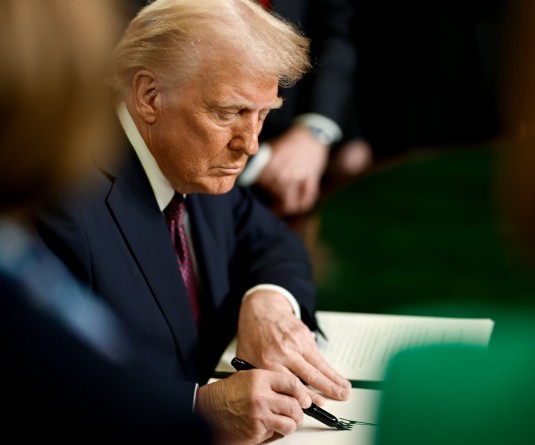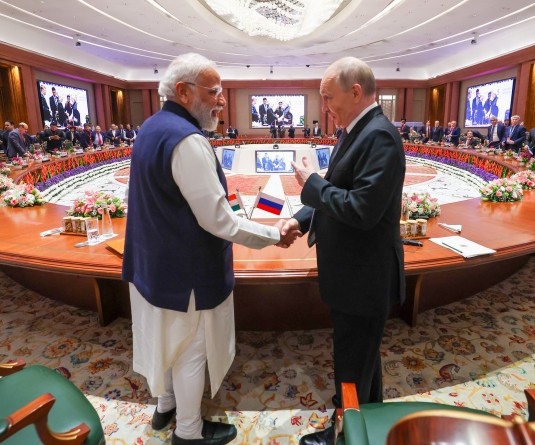
In this Thursday, March 24 photo provided by the French Army, a French Navy Rafale jet fighter takes off from deck of Charles de Gaulle aircraft carrier in the Mediterranean sea as part of the Operation Odyssey dawn. NATO’s military staff is drawing up detailed plans to assume full control of the no-fly zone over Libya in coming days, after member nations agreed to take on the operation from a U.S.-led coalition. (AP Photo)
TRIPOLI, March 25 (Reuters): Western warplanes hit Libyan forces at a strategically important eastern town, trying to land a crippling blow on Muammar Gaddafi's tanks in a nearly week-old campaign that NATO says could last three months.
In Tripoli, residents reported another air raid just before dawn on Friday, hearing the roar of a warplane, followed by a distant explosion and bursts of anti-aircraft gunfire. Western-led operations to enforce a no fly zone to stop a violent crackdown against a popular uprising won more Arab support when the United Arab Emirates said it would take part, but France cautioned the conflict would not be quick.
"I doubt that it will be days," Admiral Edouard Guillaud told France Info radio. "I think it will be weeks. I hope it will not take months." Guillaud said a French plane destroyed an army artillery battery near the eastern frontline town of Ajdabiyah, 150 km (90 miles) south of Benghazi. Ajdabiyah is strategically important for both sides as it commands the coastal highway to the west.
In London, the Ministry of Defense said British Tornado aircraft had also been active there, firing missiles overnight at Libyan military vehicles threatening civilians. In Brussels, a NATO official said on Friday planning for NATO's no-fly operation assumed a mission lasting 90 days, but this could be extended or shortened as required.
Rebel forces on the road to Ajdabiyah seemed more organized than in recent days, when fighters' disarray stirred doubts about their ability ever to pose an armed challenge to Gaddafi.
They had set up road blocks at regular intervals and Reuters counted at least four truck-based rocket launchers -- heavier weaponry than had been seen earlier this week. In the eastern rebel bastion of Benghazi, rebel spokesman Mustafa Gheriani said he expected Ajdabiyah to fall on Friday or Saturday following the overnight British and French strikes.
"This (the strikes) will weaken their forces and more importantly their morale," he said, adding the level of Western strikes was "sufficient. We feel safe under their protection." He repeated that rebels did not want ground troops and said that if Gaddafi was prevented from bringing in mercenaries, the rebels could win the ground war on their own.
The rebels' main concern was the western cities of Misrata and Zintan, besieged by government troops, he said. "They are starting to run short of basic needs," he said. A resident of Zawiyah, just west of Tripoli, said the city resembled a ghost town after heavy fighting, with some residents subject to beatings and kidnappings.
"It's a ghost town. Gaddafi's men are still firmly in control but they are facing resistance from the rebels in some streets," said Mohsen, who fled to the Tunisian border on Wednesday. Gaddafi's forces took back control of Zawiyah, about 50 km (30 miles) west of Tripoli, two weeks ago. NATO said on Thursday that after four days of tough negotiations that it would enforce the no-fly zone but stopped short of taking full command of U.N.-backed military operations to protect civilians from forces loyal to Gaddafi. Differences over the scope the U.N. resolution gave for military action against Gaddafi's army led to days of heated arguments within NATO about its role in the operation.
The United States, embroiled in Iraq and Afghanistan, is keen to step back and play a supporting role in Libya in order to preserve alliance unity and maintain the support of Muslim countries for the U.N.-mandated intervention.
SUDAN SAID TO SUPPORT NO FLY ZONE
Despite the apparently cumbersome structure of the planned new command and Arab jitters on the use of force, the operation continues to receive support from beyond Western ranks. At the United Nations, envoys said Sudan had quietly granted permission to use its airspace to nations enforcing the no-fly zone. Sudan's U.N. ambassador, Daffa-Alla Elhag Ali Osman, neither confirmed nor denied that report.
South of the Sahara, local media quoted a cabinet minister as saying Uganda would freeze Libyan assets worth about $375 million in line with a U.N. resolution imposing sanctions on Libya following Gaddafi's violence crackdown. The United Arab Emirates said it would send 12 planes to take part in operations to enforce the no-fly zone. Qatar has already contributed two fighters and two military transport planes to help enforce the no-fly zone.
According to Greek Defense Ministry source, two Qatari and two French Mirage warplanes took off from air base of Souda in Crete, southern Greece, for patrolling mission in Libya. They would not bomb ground targets, and had only air-to-air weapons. Western jets pounded targets in southern Libya on Thursday but failed to prevent government tanks re-entering the western city of Misrata, whose main hospital was besieged by armor and government snipers.
SNIPERS STILL IN MISRATA
Western commanders hope rebel forces in eastern Libya will overthrow Gaddafi, but the return of tanks to Misrata under cover of darkness highlighted the difficulties they face in trying to force the Libyan leader to cease fire.
Guns fell relatively silent in Misrata overnight, although government snipers were still in the city center, a rebel spokesman said on Friday. "The snipers are still hiding in buildings located on Tripoli Street," Sami said. "We don't know how many of them remain. The rebels have so far killed 30 of them."
Rebels say they have regained control of the port from government forces. The port is the city's lifeline to food and medical supplies, international officials say.
Residents say electricity, water and regular land and cell phone service to the town are not functioning.
In Tripoli, residents reported another air raid just before dawn on Friday, hearing the roar of a warplane, followed by a distant explosion and bursts of anti-aircraft gunfire. Western-led operations to enforce a no fly zone to stop a violent crackdown against a popular uprising won more Arab support when the United Arab Emirates said it would take part, but France cautioned the conflict would not be quick.
"I doubt that it will be days," Admiral Edouard Guillaud told France Info radio. "I think it will be weeks. I hope it will not take months." Guillaud said a French plane destroyed an army artillery battery near the eastern frontline town of Ajdabiyah, 150 km (90 miles) south of Benghazi. Ajdabiyah is strategically important for both sides as it commands the coastal highway to the west.
In London, the Ministry of Defense said British Tornado aircraft had also been active there, firing missiles overnight at Libyan military vehicles threatening civilians. In Brussels, a NATO official said on Friday planning for NATO's no-fly operation assumed a mission lasting 90 days, but this could be extended or shortened as required.
Rebel forces on the road to Ajdabiyah seemed more organized than in recent days, when fighters' disarray stirred doubts about their ability ever to pose an armed challenge to Gaddafi.
They had set up road blocks at regular intervals and Reuters counted at least four truck-based rocket launchers -- heavier weaponry than had been seen earlier this week. In the eastern rebel bastion of Benghazi, rebel spokesman Mustafa Gheriani said he expected Ajdabiyah to fall on Friday or Saturday following the overnight British and French strikes.
"This (the strikes) will weaken their forces and more importantly their morale," he said, adding the level of Western strikes was "sufficient. We feel safe under their protection." He repeated that rebels did not want ground troops and said that if Gaddafi was prevented from bringing in mercenaries, the rebels could win the ground war on their own.
The rebels' main concern was the western cities of Misrata and Zintan, besieged by government troops, he said. "They are starting to run short of basic needs," he said. A resident of Zawiyah, just west of Tripoli, said the city resembled a ghost town after heavy fighting, with some residents subject to beatings and kidnappings.
"It's a ghost town. Gaddafi's men are still firmly in control but they are facing resistance from the rebels in some streets," said Mohsen, who fled to the Tunisian border on Wednesday. Gaddafi's forces took back control of Zawiyah, about 50 km (30 miles) west of Tripoli, two weeks ago. NATO said on Thursday that after four days of tough negotiations that it would enforce the no-fly zone but stopped short of taking full command of U.N.-backed military operations to protect civilians from forces loyal to Gaddafi. Differences over the scope the U.N. resolution gave for military action against Gaddafi's army led to days of heated arguments within NATO about its role in the operation.
The United States, embroiled in Iraq and Afghanistan, is keen to step back and play a supporting role in Libya in order to preserve alliance unity and maintain the support of Muslim countries for the U.N.-mandated intervention.
SUDAN SAID TO SUPPORT NO FLY ZONE
Despite the apparently cumbersome structure of the planned new command and Arab jitters on the use of force, the operation continues to receive support from beyond Western ranks. At the United Nations, envoys said Sudan had quietly granted permission to use its airspace to nations enforcing the no-fly zone. Sudan's U.N. ambassador, Daffa-Alla Elhag Ali Osman, neither confirmed nor denied that report.
South of the Sahara, local media quoted a cabinet minister as saying Uganda would freeze Libyan assets worth about $375 million in line with a U.N. resolution imposing sanctions on Libya following Gaddafi's violence crackdown. The United Arab Emirates said it would send 12 planes to take part in operations to enforce the no-fly zone. Qatar has already contributed two fighters and two military transport planes to help enforce the no-fly zone.
According to Greek Defense Ministry source, two Qatari and two French Mirage warplanes took off from air base of Souda in Crete, southern Greece, for patrolling mission in Libya. They would not bomb ground targets, and had only air-to-air weapons. Western jets pounded targets in southern Libya on Thursday but failed to prevent government tanks re-entering the western city of Misrata, whose main hospital was besieged by armor and government snipers.
SNIPERS STILL IN MISRATA
Western commanders hope rebel forces in eastern Libya will overthrow Gaddafi, but the return of tanks to Misrata under cover of darkness highlighted the difficulties they face in trying to force the Libyan leader to cease fire.
Guns fell relatively silent in Misrata overnight, although government snipers were still in the city center, a rebel spokesman said on Friday. "The snipers are still hiding in buildings located on Tripoli Street," Sami said. "We don't know how many of them remain. The rebels have so far killed 30 of them."
Rebels say they have regained control of the port from government forces. The port is the city's lifeline to food and medical supplies, international officials say.
Residents say electricity, water and regular land and cell phone service to the town are not functioning.
Yemen’s Saleh says willing to quit under conditions
SANAA, March 25 (Reuters): Embattled President Ali Abdullah Saleh said on Friday he was ready to cede power to prevent more bloodshed in Yemen but only to what he called "safe hands" as a massive "Day of Departure" street protest against him began. Western countries are alarmed that al Qaeda militants entrenched in the Arabian Peninsula country could exploit any chaos arising from a messy transition of power if Saleh, a pivotal U.S. and Saudi ally fighting for his political life, finally steps down after 32 years in power.
"We don't want power, but we need to hand power over to safe hands, not to sick, resentful or corrupt hands," Saleh said in a rousing speech to supporters shown on state television as tens of thousands of his foes rallied elsewhere in the capital Sanaa. Thousands of Saleh supporters in Sanaa were also out early on the streets for what they dubbed the "Friday of Tolerance." "We are ready to leave power but only for safe hands," Saleh said. "We are against firing a single bullet and when we give concessions this is to ensure there is no bloodshed. We will remain steadfast and challenge them with all power we have."
Protesters encamped in their thousands outside Sanaa University for six weeks declared Friday a "Day of Departure" when they hoped to bring hundreds of thousands onto the streets in a further attempt to oust Saleh, a serial survivor of civil war, separatist movements and militant attacks. Similar mass protests on March 18 l eft 52 people dead, apparently gunned down by plainclothes snipers. That bloodshed prompted a string of generals, diplomats and tribal leaders to abandon Saleh, severely weakening his position.
Iran should be ‘stopped’ like Gaddafi: Israeli PM
MOSCOW, March 25 (AFP): Israeli Prime Minister Benjamin Netanyahu says Iran’s government should be ``stopped’’ like Gaddafi’s regime in Libya. Netanyahu said in remarks televised that Iran’s nuclear ambitions and ``dreams of world supremacy’’ pose an immediate threat to global security. He told the Vesti television channel that ``if we have to tame Gaddafi, we have to stop Tehran’s regime in the same way.’’ Netanyahu arrived in Moscow Thursday, a day after Russian President Dmitry Medvedev welcomed his Palestinian counterpart Mahmoud Abbas.
Observers believe their visits are aimed at overcoming the obstacles in the Palestinian-Israeli talks. Russia, the United States, the European Union and the United Nations make up the Quartet of Mideast mediators.
SANAA, March 25 (Reuters): Embattled President Ali Abdullah Saleh said on Friday he was ready to cede power to prevent more bloodshed in Yemen but only to what he called "safe hands" as a massive "Day of Departure" street protest against him began. Western countries are alarmed that al Qaeda militants entrenched in the Arabian Peninsula country could exploit any chaos arising from a messy transition of power if Saleh, a pivotal U.S. and Saudi ally fighting for his political life, finally steps down after 32 years in power.
"We don't want power, but we need to hand power over to safe hands, not to sick, resentful or corrupt hands," Saleh said in a rousing speech to supporters shown on state television as tens of thousands of his foes rallied elsewhere in the capital Sanaa. Thousands of Saleh supporters in Sanaa were also out early on the streets for what they dubbed the "Friday of Tolerance." "We are ready to leave power but only for safe hands," Saleh said. "We are against firing a single bullet and when we give concessions this is to ensure there is no bloodshed. We will remain steadfast and challenge them with all power we have."
Protesters encamped in their thousands outside Sanaa University for six weeks declared Friday a "Day of Departure" when they hoped to bring hundreds of thousands onto the streets in a further attempt to oust Saleh, a serial survivor of civil war, separatist movements and militant attacks. Similar mass protests on March 18 l eft 52 people dead, apparently gunned down by plainclothes snipers. That bloodshed prompted a string of generals, diplomats and tribal leaders to abandon Saleh, severely weakening his position.
Iran should be ‘stopped’ like Gaddafi: Israeli PM
MOSCOW, March 25 (AFP): Israeli Prime Minister Benjamin Netanyahu says Iran’s government should be ``stopped’’ like Gaddafi’s regime in Libya. Netanyahu said in remarks televised that Iran’s nuclear ambitions and ``dreams of world supremacy’’ pose an immediate threat to global security. He told the Vesti television channel that ``if we have to tame Gaddafi, we have to stop Tehran’s regime in the same way.’’ Netanyahu arrived in Moscow Thursday, a day after Russian President Dmitry Medvedev welcomed his Palestinian counterpart Mahmoud Abbas.
Observers believe their visits are aimed at overcoming the obstacles in the Palestinian-Israeli talks. Russia, the United States, the European Union and the United Nations make up the Quartet of Mideast mediators.






